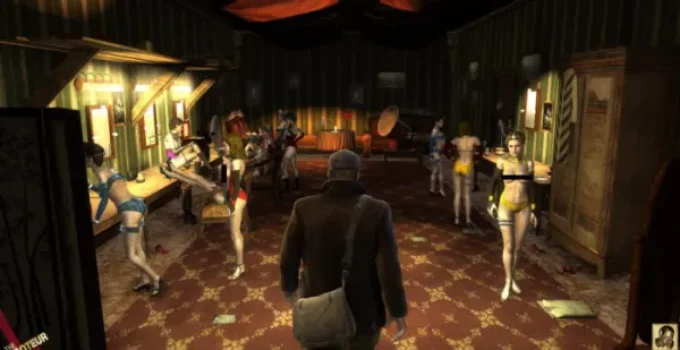THE SABOTEUR: FLASH FOR CASH
MOST EMBARRASSING MICROTRANSACTIONS
The Saboteur was a rather middling affair that you probably don’t remember very well. For those who can, there were two big takeaways that stuck in the mind: one, the protagonist was a facepalmingly stereotypical Irishman; two, the jarring “flash for cash” bar-scene with a scandalous microtransaction.
In a smoky part of the game’s small French town setting, players find themselves hauled up in a bar full of young lovelies, who are donning some very naughty lace. But these woman of questionable morals are actually good girls — covered up (fairly) appropriately. Boo! Want to see more? No problem, the publisher only asks for a few dollars to see their nipples. Yes, real currency for digital boobies.
An utterly disgraceful microtransaction that should never feature in any video game.
BATTLEFIELD 3 & 4: SHORTCUT PACK
MOST EMBARRASSING MICROTRANSACTIONS
Both Battlefield 3 and 4 offered an atrocious microtransaction that totally spoiled both game’s multiplayer offering. For $40 on top of the game’s base price, players could unlock all bonus maps and content immediately, including special weapons.
It was among the first examples of what has become a frustrating mainstay of many multiplayer games: pay to win. In Battlefield, those who fork out wads of cash get a huge advantage over players who graft through the game honestly. Indeed, access to the same arsenal of weaponry made available in the Ultimate Shortcut Pack would take the equivalent of hundreds of hours of actual gameplay, and you still wouldn’t have the anywhere near the same level of equipment. Nice and fair, then.
DEAD SPACE 3: PAY TO CRAFT
MOST EMBARRASSING MICROTRANSACTIONS
A good survival horror game has players constantly questioning whether to use precious resources and supplies, nervously measuring up the risk/reward of every dangerous situation. It’s what builds the tension that makes this genre of game tick, and Dead Space was a franchise that was utterly brilliant at it. But EA’s introduction of microtransactions pertaining to the game’s crafting mechanics completely destroyed that delicate balance.
Clearly, by its third iteration, EA was determined to squeeze a little more cash from the Dead Space franchise, by adding a microtransaction to purchase key ingredients for crafting, the resource management of the game’s survival horror was thrown out the window. Now players had the equivalent of Amazon Prime delivery in their inventory, and whatever they needed could be spawned by the click of a purchase button. The silly thing was, all of the crafting resources were easily obtainable by playing through the game properly.
FIFA’S ULTIMATE TEAM
MOST EMBARRASSING MICROTRANSACTIONS
FIFA Ultimate Team, commonly called FUT, is a mode that lets players create their own team to play against each other in a sort of fantasy league. You start in the game’s lowest divisions, pitted against other players of the same rank, working your way up. Along the way, you’ll be able to purchase the league’s best talent and add them to your ranks. It all sounds great in practice, but the problem is that everyone wants more or less the same players. EA decided that was a bit of an issue, so they fabricated an obstacle to supposedly create more team diversity. You guessed it: microtransactions.
In FUT, players purchase decks of cards that randomly allocates a draft of potential players. The trouble is, the price point of the in-game currency to unlock these decks is absurdly high. The only realistic way to have a chance of drafting a Messi or Ronaldo is to pay for it. Here’s the kicker, though: the players are effectively on loan, with contracts that expire. If one wants to hold on to their star players, one will need to repurchase the cards. Expect to pay through the nose if you want to enjoy the best of this poorly designed FIFA mode.








